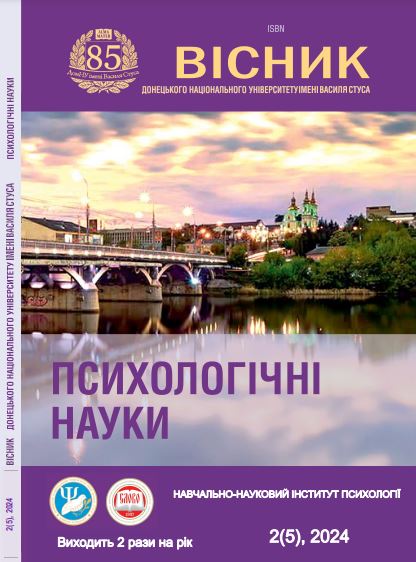Psychosemantic analysis of imagination about professionin context the motivation to learn in future psychologist
DOI:
https://doi.org/10.31558/2786-8745.2024.2(5).1Keywords:
meaning, motive, professional development, psychosemantic, sense, imaginationAbstract
In the article we’ve analyzed the educational motivation of future specialists in psychology. We’ve described psychosemantic base of investigations. The theoretical analysis of classical views in psychosemantic has been carried out in this investigation. It’s known, that imaginations are main components of consciousness. As the result, the theoretical analysis we made hypothesis that imaginations of consciousness are determining in formation of educational motivation of future psychologists. We have realized empirical analysis of associations with using colors to prove the hypothesis that students with different professional motivation prefer different color in the test. It was established that basic associations underlined student’s imaginations about their future profession. We‘ve used classical psychosemantic methods (semantic differential, associative test) for investigation. The relationship between material and spiritual values was identified in our investigation. The students don’t strive for the advanced role and career. The interest in a future profession prevails over other motives and salary. The altruistic motivation is more pronounced than tendency to find an interesting job. The students are interested in liking their future profession. The motives of professional and self-development and general values are very important. The motives of self-affirmation and self-realization have a high level too. The self-realization is manifested in context of help people. The imaginations about psychology are associated with calm and confidence. The session makes an anxiety and strain in students. It has the highest level of negative perception compared to other indicators. The students tend self-realization, harmony, positive emotions, spiritual development and other positive things.
References
Osgood Ch., Suci G. Measurement of meaning. Urbana. 1957.
Keith S. Taber Constructive Alternativism: George Kelly’s Personal Construct Theory. 2020. DOI: 10.1007/978-3-030-43620-9_25
Ershova R. Psychological Well-Being in Highly Sensitive People. Applied Psychology Readings. 2023. DOI: 10.1007/978-981-99-2613-8_5
Lippman Walter. Public Opinion. New York, London: The Free Press. A Division of Macmillan Publishing Co., Inc. New York; Colier Macmillan Publishers, London, 1949. 268 p.
Rogers C. On becoming a Person. Boston Houghton Mifflin Company. 1995. 367 p.
Osgood, C. E. Method and Theory in Experimental Psychology. NY, 1953. 156 p.

